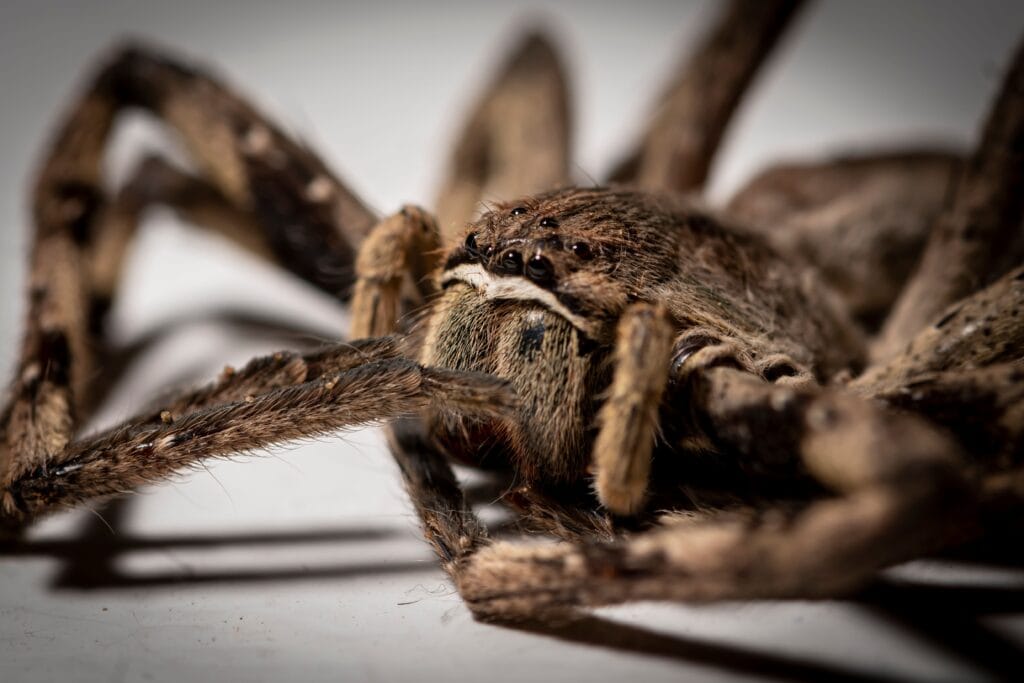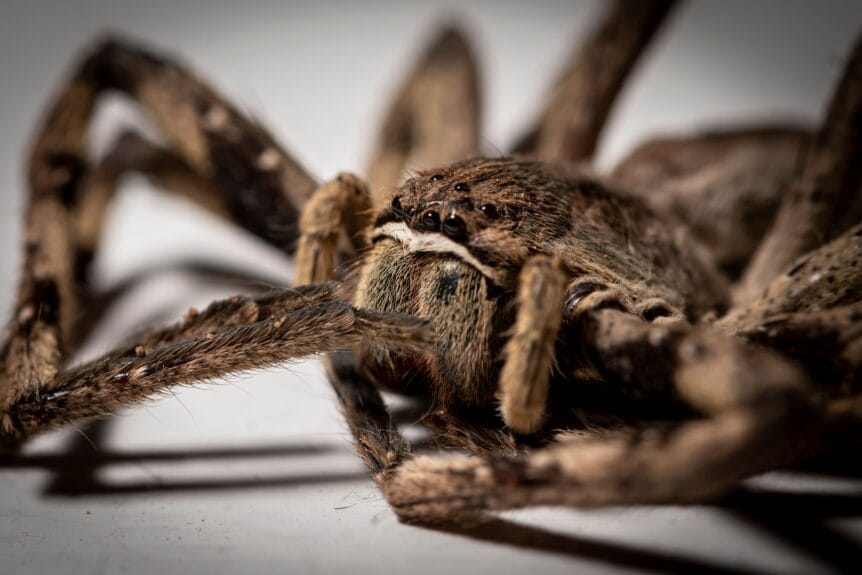Wolf spiders are highly skilled hunters that chase and ambush their prey rather than building webs. With a diet of insects such as crickets, ants, and flies, wolf spiders can be an effective natural pest control in your yard.
Biology
Wolf spiders can be a combination of brown, gray, and black and can be up to 2 inches in size, with the females usually larger than the males. Covering their entire bodies, they have thousands of tiny hairs called setae. These hairs act as sensory receptors and allow the spider to sense approaching prey, helping them be more effective hunters.
Like most spiders, wolf spiders have eight eyes. They have three rows of eyes; four small eyes on the bottom row, two large forward-facing eyes in the middle row, and two more medium-sized eyes on the top row, facing to the left and right. Of all the types of spiders, wolf spiders have the third-best eyesight, which they use for hunting. They can also see well in the dark because many of their eyes have a light-reflecting layer that acts as a light source.
Female wolf spiders will travel to a safe, isolated area to lay their eggs, where they may lay 100 or more. They then wrap the eggs in a silk sac and carry it with them on their abdomen, even when hunting. When the eggs are ready to hatch the mother spider will bite the sac and let them emerge. Even after emerging from the sac, the baby spiders will stay with the mother on her back for a few weeks while they grow.
Powerful Hunters
The wolf spider is named for its amazing hunting ability. Their diet includes mainly small insects like crickets, grasshoppers, ants, flies but they sometimes will eat other spiders. Unlike other types of spiders, wolf spiders don’t use webs to catch their prey, but instead use hunting and ambushing skills. With their excellent eyesight, a strong sense of touch, and high speed, wolf spiders will either chase down and capture or wait for and ambush their prey. Using their eight eyes to clearly see their prey even at night, wolf spiders can sprint after insects in bursts of up to 10 mph. Once the insect is caught, the spider will bite it with its fangs and inject its venom. The insect will first be paralyzed by the venom’s neurotoxins and then its organs will be broken down by the venom’s enzymes. Once the insect is liquefied, the spider will consume its nutrients.

Interactions with Humans
Wolf spiders aren’t hostile to people unless they feel threatened. If they are trapped or provoked, they can bite humans. However, their bite isn’t lethal to humans like it is to small insects. Wolf spider venom is used to paralyze and liquefy insects so the spider can consume its prey. But the venom isn’t as potent as other spiders’ and it doesn’t cause humans any serious harm.
If you get bit by a wolf spider, it will look like a bug bite with a red bump and some swelling. It may be painful or itchy and may also have puncture marks. You don’t usually need to seek medical attention unless your symptoms get worse or don’t go away after a few days or if you have an allergic reaction. To treat the bite at home, you can clean out the bite, apply an ice pack, avoid scratching it, and take an OTC pain reliever for any pain or swelling.
Beneficial Bugs
Known as beneficial bugs, wolf spiders can be effective as a natural pest control. As hunting predators, the spiders can get rid of several unwanted pests in your yard such as crickets, cockroaches, beetles, and flies. This can help protect your garden and plants from damage. Another benefit that wolf spiders can bring to your garden is improving the health of the soil. Wolf spiders mainly live underground and their burrowing can aerate the soil, bringing it nutrients.
When They Become a Problem
You are more likely to see wolf spiders indoors during the fall when they start looking for a warm shelter for the winter and during their mating season in the spring and summer. Since they hunt for insects, having wolf spiders in your home can indicate that there is a steady food source of insects inside.
If you find a single wolf spider, it is unlikely to harm you or indicate an issue with your home. You generally shouldn’t try to kill a wolf spider as they can be beneficial as pest control. In addition, killing a spider with an egg sac attached will lead to an infestation of spiders within your home. To safely relocate the spider, use a cup and piece of paper to trap it and move it outside. A wolf spider infestation is unlikely because they usually hunt alone, but if you frequently find the spiders in your home and they become a nuisance, you should reach out to a professional pest control company for help. They can help you safely and effectively take care of your spider problem.
More from Bugg Control, Inc.
Check out information about “buggs” and more to be informed about keeping your home safe from pests. If you have questions or want pest control expertise, contact us today!
Stay up-to-date by following our socials: Facebook | X | YouTube

